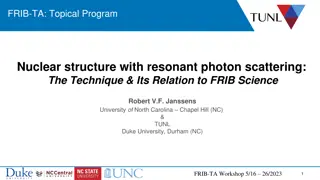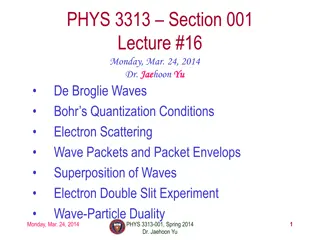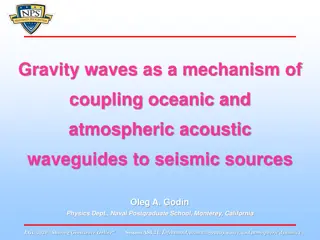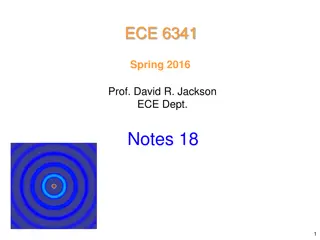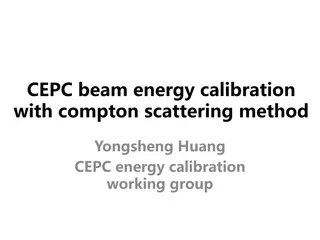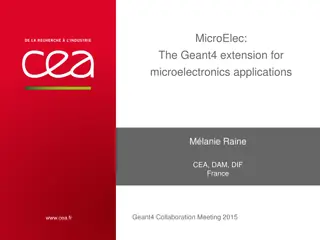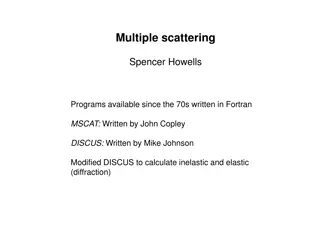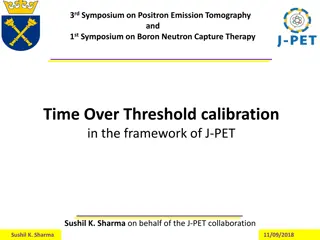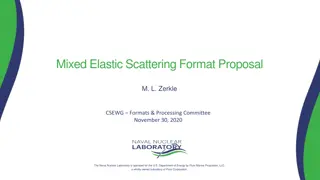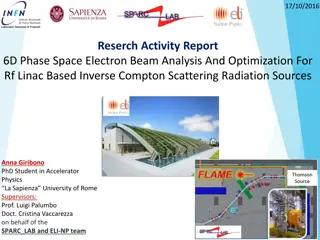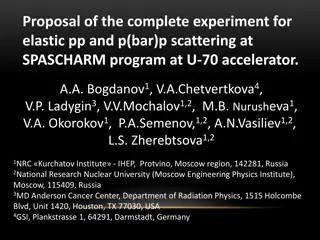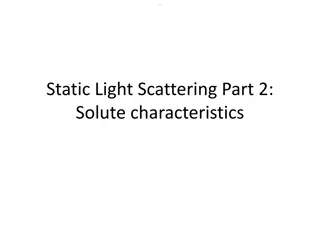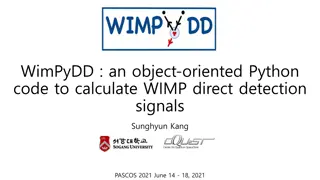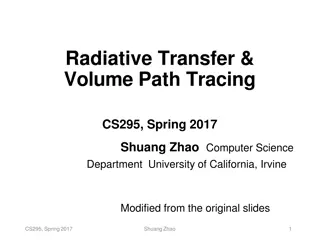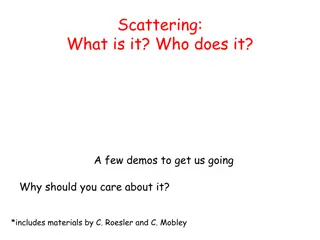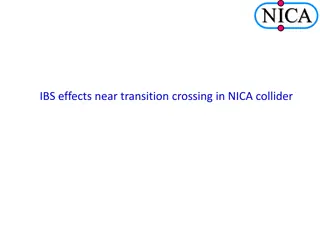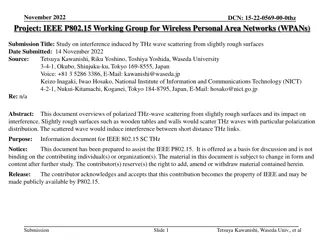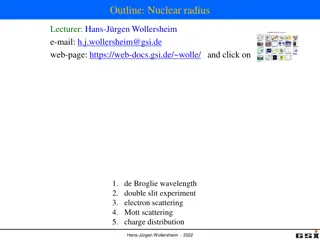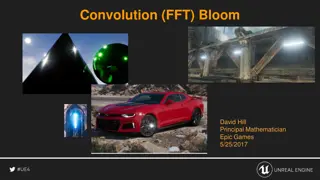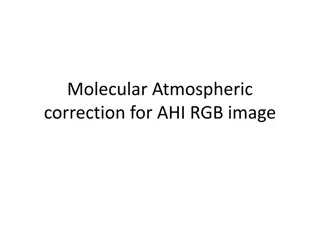Advanced Techniques in Materials Science: Transmission Electron Microscopy
Explore the advanced techniques used in materials science, focusing on Transmission Electron Microscopy (TEM). Learn about the challenges with optical microscopes, the principles of TEM imaging, and the application of scattering theory in electron microscopy. Discover how TEM offers higher resolutio
3 views • 19 slides
Nuclear Structure Investigations with Resonant Photon Scattering at FRIB-TA Workshop
Explore nuclear structure using resonant photon scattering at the FRIB-TA Workshop. The High Intensity Gamma-ray Source facility enables research on photonuclear reactions, spin and parity determinations, and selective investigation of nuclear states. Learn about the technique's potential impact on
2 views • 33 slides
Evolution of Mathematical Theories and Proof Systems
Development of mathematical theories such as model theory, proof theory, set theory, recursion theory, and computational complexity is discussed, starting from historical perspectives with Dedekind and Peano to Godel's theorems, recursion theory's golden age in the 1930s, and advancements in proof t
1 views • 29 slides
Psychological Theories of Criminality: Understanding the Roots
Psychological theories of criminality delve into the association between intelligence, personality, learning, and criminal behavior. Major theories include Psychodynamic Theory by Freud, Behavioral Theory by Bandura, and Cognitive Theory by Kohlberg. These theories explore how unconscious mental pro
1 views • 20 slides
Understanding the Theory of Firms: Neoclassical vs. Modern Approaches
The theory of firms is explored through the Neoclassical and Modern perspectives. Neoclassical theory focuses on profit maximization, while Modern theory delves into managerial, principal-agent, and transaction cost theories. The discussion covers criticisms of Neoclassical theory and the essential
1 views • 79 slides
Theories of Causation in Psychological and Social Sciences
Overview of theories of causation categorized into psychological, social psychological, and sociological perspectives. Psychological theories focus on instinctive, biological, and psychological qualities of abusers, including Attachment Theory, Psychodynamic Theory, Social Learning Theory, and Situa
0 views • 15 slides
Understanding Political Theory through a Contextual Approach
Exploring G.H. Sabine's perspective on political theory through a contextual approach, emphasizing the importance of historical context and societal influences. Sabine argues that while political theory evolves with its contemporary politics, it should be analyzed within its specific time and social
0 views • 9 slides
Evolution of Light Theory: From Wave Theory to Quantum Theory
At the turn of the century, the discovery of the photoelectric effect challenged the wave theory of light, leading to the development of the quantum theory by Max Planck and Albert Einstein. This new theory introduced the concept of discrete energy units known as quanta, bridging the gap between wav
1 views • 62 slides
Advanced Neutron Scattering Research Project at ORNL
This project proposal outlines a research opportunity at Oak Ridge National Laboratory (ORNL) focusing on forefront scientific problems and the strategic value of neutron scattering techniques. Graduate students will benefit from valuable experience and collaboration opportunities during their time
0 views • 5 slides
Dp-branes, NS5-branes, U-duality, and M-Theory Overview
Overview of Dp-branes, NS5-branes, and U-duality derived from nonabelian (2,0) theory with Lie 3-algebra. Introduction to M-theory, including M2-branes and M5-branes in the strong coupling limit. Discussion on BLG theory, Lorentzian Lie 3-algebra, and the ABJM theory for M2-branes.
1 views • 32 slides
Exploring De Broglie Waves, Bohr's Quantization, and Electron Scattering in Physics
Discover the fascinating concepts of De Broglie waves, Bohr's quantization conditions, and electron scattering in physics. Delve into the wave-particle duality, electron double-slit experiments, and the groundbreaking observations by Davisson and Germer. Uncover the implications of mass particles ha
0 views • 23 slides
Introduction to Dynamic Light Scattering - Day 1 Recap
Introduction to Dynamic Light Scattering covered concepts, lab measurements, and analysis of diffusive time scales. Topics included measuring DI water, PS latex spheres, and a mystery sample. Results showed highly mono-dispersed PS latex standards and discussed challenges in analyzing mixtures of di
0 views • 4 slides
Gravity Waves as a Mechanism of Coupling Oceanic and Atmospheric Acoustic Waveguides to Seismic Sources
Direct excitation of acoustic normal modes in horizontally stratified oceanic waveguides is negligible for shallow earthquakes due to velocity disparities. This study evaluates the contribution of scattering by hydrodynamic waves in generating abyssal T-waves. The research explores the role of scatt
1 views • 6 slides
Electromagnetic Scattering by Wedge and Line Source Notes
In these notes from ECE 6341, Spring 2016, Prof. David R. Jackson covers the topic of scattering by a wedge and line source. The discussion includes boundary conditions, Bessel functions, integration techniques, and more, providing a thorough exploration of the electromagnetic phenomena involved.
0 views • 27 slides
Understanding Time-Independent Perturbation Theory in Quantum Mechanics
Perturbation theory is a powerful tool in solving complex physical and mathematical problems approximately by adjusting solutions from a related problem with known solutions. This theory allows for more accurate approximate solutions by treating the difference as a small perturbation. An example inv
0 views • 19 slides
Ethical Theories: Divine Command vs. Virtue Theory Explained
Divine Command Theory asserts that morality is derived from God's commands, contrasting with Virtue Theory which focuses on developing moral virtues to achieve human flourishing and excellence. Divine Command Theory relies on religious texts, while Virtue Theory emphasizes the cultivation of virtues
0 views • 24 slides
Beam Energy Calibration with Compton Scattering Method
The CEPC beam energy calibration with Compton scattering method led by Yongsheng Huang and the CEPC energy calibration working group involves collaborations with various institutions and organizations. The project includes detailed physics requirements, system designs, and implementation plans for b
0 views • 14 slides
Understanding PN Junction in Semiconductors
Mobility in semiconductors is affected by scattering events as temperature increases, with impurity scattering dominating at low temperatures and lattice scattering at high temperatures. A p-n junction is the interface between p-type and n-type semiconductor materials, with excess holes on the p-sid
0 views • 15 slides
Geant4 MicroElec Extension for Microelectronics Applications
The MicroElec extension is a part of the Geant4-DNA framework designed for microelectronics applications, focusing on ionizing cross-section calculations for incident electrons, protons, and heavy ions. It utilizes the Complex Dielectric Function Theory (CDFT) to determine energy loss functions and
0 views • 9 slides
Understanding Fermi Liquid Theory in Interacting Fermion Systems
Fermi liquid theory, also known as Landau-Fermi liquid theory, is a theoretical model that describes the normal state of metals at low temperatures. Introduced by Landau and further developed by Abrikosov and Khalatnikov, this theory explains the similarities and differences between interacting ferm
0 views • 23 slides
Understanding Multiple Scattering Programs in Fortran for Neutron Diffraction and Inelastic Analysis
Multiple scattering programs like MSCAT and DISCUS, written in Fortran since the 70s, are essential tools for neutron diffraction and inelastic analysis. These programs allow for the calculation of neutron cross-sections, scattering angles, and sample geometries. The results obtained include elastic
0 views • 8 slides
Understanding Semiconductor Conductivity and Scattering Mechanisms
In the study of semiconductor conductivity, the concept of degenerate and non-degenerate semiconductors is discussed, showcasing the impact of doping levels. The conductivity equation is explored in terms of electron and hole mobilities and densities. The role of scattering mechanisms, such as latti
0 views • 18 slides
Symposium on Positron Emission Tomography and Boron Neutron Capture Therapy Time-Over-Threshold Calibration in J-PET
The 3rd Symposium on Positron Emission Tomography and 1st Symposium on Boron Neutron Capture Therapy focused on Time-Over-Threshold calibration within the framework of J-PET. The event outlined experimental details, event selection, results, and key features of the Jagiellonian Positron Emission Tom
0 views • 35 slides
Computational Learning Theory: An Overview
Computational Learning Theory explores inductive learning algorithms that generate hypotheses from training sets, emphasizing the uncertainty of generalization. The theory introduces probabilities to measure correctness and certainty, addressing challenges in learning hidden concepts. Through exampl
0 views • 43 slides
Automata Theory and Theory of Computation Overview
This course overview covers concepts in automata theory and theory of computation, including formal language classes, grammars, recognizers, theorems in automata theory, decidability, and intractability of computational problems. The Chomsky hierarchy, interplay between computing components, modern-
0 views • 42 slides
Theories of Interest in Microeconomics II
Explore various theories of interest in economics, including the Classical Theory, Liquidity Preference Theory by Keynes, Productivity Theory, Abstinence Theory, Time-Preference Theory, Fisher's Time Preference Theory, and the Loanable Fund Theory. These theories offer different perspectives on the
0 views • 6 slides
Exploring the Evolution of Atomic Theory
Delve into the historical journey of atomic theory starting from Democritus and Aristotle's views to modern advancements proving some aspects of Dalton's theory incorrect. Learn about key laws and theories such as the Particle Theory of Matter, Dalton's Atomic Theory, and JJ Thomson's discoveries, s
0 views • 30 slides
Mixed Elastic Scattering Format Proposal
This proposal focuses on introducing a Mixed Elastic Scattering format to address the need for a more rigorous treatment of thermal elastic scattering effects in selected nuclides. The format extension, compatible with ENDF-6, supports advanced moderator development without impacting existing TSL ev
0 views • 6 slides
Electron Beam Analysis and Optimization for RF Linac in Inverse Compton Scattering
This research activity report discusses the analysis and optimization of a 6D phase space electron beam for RF Linac-based Inverse Compton Scattering radiation sources. It covers the SPARC_LAB Thomson Source and ELI-NP GBS, including experiments, simulations, and studies on beam parameters and struc
0 views • 26 slides
Investigation of Spin Observables in Elastic pp and p(bar)p Scattering at SPASCHARM Program
Measurements of spin observables in elastic pp and p(bar)p scattering at 16 GeV will be conducted at the SPASCHARM program using a unique setup with polarized proton and antiproton beams. The experiment aims to extend the energy range for spin studies and compare elastic scattering in pp and p(bar)p
0 views • 24 slides
Understanding Light Scattering Part 2: Solute Characteristics and Applications
Light scattering can provide valuable insights into solute characteristics such as molecular weight, radius of gyration, and second virial coefficient. By analyzing scattering data, information about individual particles and their arrangement in solution can be obtained. Techniques like Zimm or Guin
0 views • 20 slides
Object-Oriented Python Code for WIMP Direct Detection Signals
Calculating signals for Weakly Interacting Massive Particle (WIMP) direct detection using an object-oriented Python code called WimPyDD. WimPyDD provides accurate predictions for expected rates in WIMP direct detection experiments within the framework of Galilean invariant non-relativistic effective
0 views • 24 slides
Understanding Radiative Transfer and Volume Path Tracing
Explore the mathematical model of radiative transfer for simulating light scattering in participating media and translucent materials through volume path tracing. Learn about subsurface scattering and how radiance changes along ray segments in participating media. Delve into the origins and applicat
0 views • 44 slides
Understanding Scattering Phenomenon: Key Concepts and Applications
Scattering is a fundamental process involving the interaction of light with particles, impacting various fields such as physics and environmental science. Learn about its measurement theory, dependence on physical properties, and examples like Rayleigh theory for small particle scattering and impact
0 views • 36 slides
Insights into Intra-Beam Scattering Effects and Plasma Dynamics in Particle Colliders
Intra-Beam Scattering (IBS) effects near transition crossing in NICA collider result in energy exchange between different degrees of freedom, impacting beam size, luminosity, and lifetime. The IBS phenomenon is crucial for circular machines, with theoretical developments by Piwinski and Bjorken shap
0 views • 15 slides
Macromechanical Analysis of Lamina and Tsai-Hill Failure Theory Overview
The Tsai-Hill failure theory is based on the strengths of a unidirectional lamina, incorporating longitudinal and transverse tensile and compressive strengths, as well as in-plane shear strength. This theory, derived from the distortion energy theory, provides criteria for determining lamina failure
0 views • 15 slides
Study on THz Wave Scattering from Slightly Rough Surfaces: Interference and Implications
Overview of polarized THz wave scattering from slightly rough surfaces such as wooden tables and walls. The document discusses the induced interference between short-distance THz links and presents a model of electromagnetic wave scattering with examples of experimental and numerical results. Potent
0 views • 17 slides
Insights into Nuclear Radius and Electron Scattering Experiments
Delve into the realm of nuclear physics with a focus on nuclear radii and electron scattering experiments led by lecturer Hans-Jürgen Wollersheim. Explore topics such as de Broglie wavelength, double-slit experiment, Mott scattering, charge distribution, and the use of electrons as probes to measur
0 views • 9 slides
Understanding Bloom Effects in Game Design
Bloom effects, such as weak scattering and convolution, enhance the visual appeal of games by simulating light scattering. They add realism and customization options to game graphics, improving the overall visual experience. Weak scattering causes subtle yet impactful effects like glare and diffract
1 views • 14 slides
Atmospheric Correction Techniques for Satellite Image Enhancement
Atmospheric correction is essential for improving the quality of Remote Sensing images captured by satellites. This process involves correcting for the effects of atmospheric gases such as scattering and absorption on the measured Top-of-Atmosphere (TOA) reflectance. Techniques like molecular correc
0 views • 8 slides

